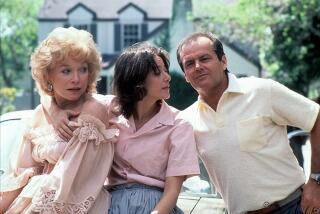Affectionate Look at the Maverick ‘Wild Bill’
- Share via
In a world entranced with the output of failed auteur Ed Wood, it’s not surprising that the films of a complete professional like William Wellman find themselves farther from the limelight. But for those who knew and worked with him, the man himself is harder to forget.
Even now, nearly 40 years after Wellman’s last film, people like Clint Eastwood and Robert Redford can do little more than shake their heads in awed memory of how cantankerous an individual he was. Even Nancy Reagan, not exactly a pushover, respectfully recalls that the man “could be very intimidating.”
These tales and more are the heart of “Wild Bill: Hollywood Maverick,” written and directed by Todd Robinson and playing at the Nuart, an affectionate tribute of the “print the legend” variety to an unjustly neglected figure from the movies’ golden age. Combining interview footage with clips from some of Wellman’s 76 features, “Wild Bill,” narrated by Alec Baldwin, brings this maverick director into deserved focus again.
On one level, Wellman’s pugnacity, his legendary explosive temper, made him an unlikely candidate for success in the studio system. Here, after all, was someone who delivered a load of horse manure to a Paramount executive’s office with the message, “That’s what I think of your lousy script,” and once told Jack Warner: “If I ever catch you in the men’s room, I’m going to put you in the hospital for six weeks.”
*
Yet his speed, decisiveness and skill made Wellman a valued commodity. One of the generation of directors who put the experiences of a rugged life into his work, Wellman made movies that earned 32 Oscar nominations, including four best picture nods and three for best director for himself.
Early photographs show a Wellman who was ferocious almost from birth. The key experience in his life came at age 19 when he became a pilot in the French army’s Lafayette Flying Corps, active in combat before America’s official entry into World War I.
Wellman got his “Wild Bill” nickname during this time, and nearly lost his life in a wreck. Aviation continued to be critical to his life: He got his first job in Hollywood after landing his plane on the lawn of Pickfair and asking Douglas Fairbanks, whom he’d met years earlier, to help him out.
And his initial triumph, good enough to win the first best picture Oscar, was “Wings,” the 1927 story of World War I aviators that benefited from Wellman’s stubbornness as well as his experience. He held up shooting the film’s landmark aerial sequences for a month until the skies offered up precisely the kind of cloud formations he had in mind.
For all his tough-guy exterior, emotion of any type did not trouble Wellman. “Wings” features a kiss on the mouth between co-stars Charles “Buddy” Rogers and Richard Arlen that celebrated the depth of their friendship, and James Cagney’s furious squashing of a grapefruit into Mae Clarke’s face in “Public Enemy” became perhaps the best-known moment of the ‘30s.
*
Wellman also delighted in tackling tough subjects in his films. His examination of mob justice in “The Ox-Bow Incident” caused a stir in its time. Still quite impressive today are a pair of socially conscious dramas he did in the 1930s, “Wild Boys of the Road” (which starred his wife, Dorothy Coonan) and “Heroes for Sale.” (“Westward the Women,” one of Wellman’s least-seen films, will be screened at the Nuart for one performance only, May 19 at noon.)
A cranky iconoclast to the end, Wellman insisted, “I’m not retiring, I’m quitting,” when his most personal project, “Lafayette Escadrille,” proved to be his final film. His son William Wellman Jr., “Wild Bill’s” executive producer, says his father once told him, “I’ve lived the life of 100 men.” This warm and engaging film shows what he meant.
* Unrated. Times guidelines: suitable for all film buffs.
‘Wild Bill: Hollywood Maverick’
A Wild Bill Pictures production. Writer-director Todd Robinson. Producer Ken Carlson. Executive producer William Wellman Jr. Cinematographer Theodore Angell, Christian Sebaldt. Editor Leslie Jones. Music David Bell. Narrator Alec Baldwin. Running time: 1 hour, 33 minutes.
* Exclusively at the Nuart, 11272 Santa Monica Blvd., West Los Angeles, (310) 478-6379.
More to Read
Only good movies
Get the Indie Focus newsletter, Mark Olsen's weekly guide to the world of cinema.
You may occasionally receive promotional content from the Los Angeles Times.











